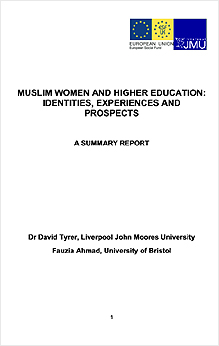
Author: Dr David Tyler and Fauzia Ahmad
Publisher: Liverpool John Moores University and European Social Fund
Release Date: 2005
Pages: 40
Source: http://www.mywf.org.uk/uploads/projects/borderlines/Archive/2007/muslimwomen.pdf
“They [the media] sort of assume that Muslim women are just very docile, subservient, stay at home, don’t have any external responsibilities, but I know that in my family that’s not the case .I think its just because we are so distinctive, not just in terms of colour but the physical, you know, wearing the hijab, it’s so explicit. You can’t hide away from it and I think people have a lot of presumptions.”
These comments, by a 20 year old History student of Pakistani origin, highlight the resilience and courage of second/third generation Muslim women seeking out that elusive but essential path of integration without assimilation. The researchers are to be commended for having obtained the trust of a large number of survey respondents and eliciting from them their real-life experiences.
There is a sufficient base of data to challenge certain stereotypical views on Muslim women: that they are discouraged from entering higher education by their parents, particularly the fathers or that they avoid making white British friends.
The research found that many Muslim women cited their families as key sources of encouragement and motivation towards higher education study and in thinking about future careers although for some there may have been some disagreements over the choice of subject studied at degree level and the university the core aim of degree attainment was shared by many women and parents. This represents one of the reports key findings The study also found a large proportion of Muslim women citing their fathers as key sources of motivation and encouragement. Interestingly, some women did express concerns that they risked being too educated for prospective suitors , and with more Pakistani and Bangladeshi women entering higher education than men, the inference for the future is that there will be increasing cross-cultural and cross-ethnic marriages within the Muslim community.
The researchers note that “for some of our respondents, being understood and accepted for their social preferences often came to mean finding other friends from minority backgrounds who would accept them without expecting them to justify or explain themselves ..for other respondents, finding white British friends who were able to understand the social choices they make (particularly if these choices involved rejecting alcohol), was also something appreciated”.
Not without a sense of humour, the study finds that a number of respondents demonstrated considerable in-depth knowledge of halal city centre restaurants to visit.
The researchers found that experiences of Islamophobia varied greatly, and covered many aspects of university life. By far the most common manifestation reported by respondents was verbal abuse and harassment. While almost two-thirds of respondents reported feeling that racism and sexism would not be tolerated in their universities, only one in three reported feeling that Islamophobia would not be tolerated in their universities.
This is an illuminating empirical study and its findings have a ring of truth. It ought to be read not just to obtain a better appreciation of the day-to-day life of Muslim women in higher education, but also for its literature references and examples of institutional good practice.
